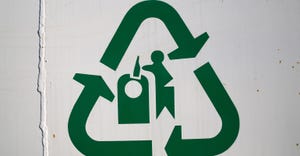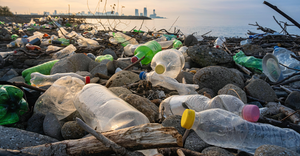February 1, 2004
Rebekah A. Hall
THE U.S. ENVIRONMENTAL Protection Agency (EPA), Washington, D.C., has cancelled its involvement and funding with the National Electronic Product Stewardship Initiative (NEPSI), a group focused on finding a better system to recycle electronic waste (e-waste). However, that doesn't mean the EPA and many others have given up trying to manage this growing part of the waste stream.
According to the agency, electronics are the fastest growing portion of America's trash. Mobile phones will be discarded at a rate of 130 million per year by 2005, resulting in 65,000 tons of waste. That same year, 250 million computers also will become obsolete, the EPA says.
NEPSI was formed by representatives from the waste and recycling industry, states and local governments. As part of its agenda, the group has focused on finding a financing system to better recycle e-waste, mainly televisions and personal computers; creating voluntary endeavors industry and government can engage in to increase e-waste recycling; and developing legislative solutions that could help better manage e-waste.
According to Clare Lindsay, EPA project director for Extended Product Responsibility in the Office of Solid Waste, the EPA “remains very supportive of these kinds of [projects] to bring people together to work out solutions that make sense.” The EPA was providing funding for the group's dialogue in the second half of 2003. However, when the agency realized federal legislative solutions would subsequently lead to lobbying efforts, the agency was advised by its legal council to break from NEPSI because the EPA is restricted from lobbying.
Nevertheless, the EPA hasn't left the building when it comes to e-waste. “Although we were advised to remove ourselves from the [NEPSI dialogue], we have a number of [e-waste] projects underway … that we have been involved in,” Lindsay says.
For example, the EPA is part of the Federal Electronics Challenge [www.federalelectronicschallenge.net] and offers the Electronic Product Environmental Assessment Tool [www.epeat.net] on its Web site. Also, the agency's “Plug-In To eCycling” campaign brings the EPA together with manufacturers, retailers and local governments to promote proper e-waste recycling [www.plugintoecycling.org].
As part of its “Plug-In To eCycling” campaign, on Jan. 9, the EPA announced a partnership with Staples, Framingham, Mass., and the Product Stewardship Institute, Lowell, Mass., in which participating electronics manufacturers would pay to have their products collected at 26 regional Staples stores for recycling. Partner companies include AT&T Wireless, Best Buy, Dell, Sharp, Sony and the Recycle America Alliance, a subsidiary of Houston-based Waste Management Inc.
The “EPA remains very involved in electronics, and we're trying to stay involved in every aspect of the lifecycle of electronics to bring about greener solutions,” Lindsay says.
Other organizations and individuals also are working to combat e-waste generation increases and find recycling solutions. Congressman Alan Mollohan, D-W. Va., for instance, recently obtained $3 million for a high-tech recycling initiative through the Energy Department's 2004 appropriations bill. The program, “Mid-Atlantic Recycling Center for End-of-Life Electronics” (MARCEE), will finance electronics recycling research.
As another example, the Solid Waste Authority of Central Ohio (SWACO), Grove City, Ohio, is one of several government groups that has hosted e-waste collection events to properly dispose of and recycle unwanted e-waste. In 2003, SWACO gathered approximately 100 tons of equipment during three e-waste collection events.
The waste industry, electronics manufacturers and many individuals agree that the United States has a long way to go to find sensible e-waste solutions. Yet even without the EPA funding NEPSI, it looks like the e-waste dialogue will continue.
You May Also Like


